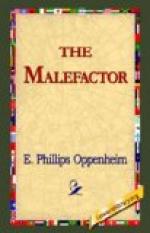“I went into prison one man, I came out another. While I live, I shall never be able to think kindly again of a single one of my fellow creatures. It was not my fault. So far as our affections are concerned, we are machines, all of us. Well, my mainspring has broken.”
“I don’t believe it,” she declared.
“It is, nevertheless, true,” he affirmed calmly. “I am living in exile because I have no friends, because friends have become an impossibility to me. I shall not tell you any more of my life because you are young and you would not believe me if I did. Some day,” he added grimly, “you will probably hear for yourself.”
“I shall never believe anything,” she declared, “which I do not choose to believe. I shall never believe, for instance, that you are quite what you think yourself.”
“We will talk of other things,” he said. “Five years ago, you showed Aynesworth where the seagulls built.”
“And now I will show you,” she exclaimed, “if you are sure that your head is steady enough. Come along!” . . .
It was after dinner that she took him into the picture gallery. Miss Harrison, very much disturbed by the presence of the master of Tredowen, and still more so by the hint which she had already received as to coming changes, followed them at a little distance.
“I am so sorry,” Juliet said, “that we have no cigars or cigarettes.”
“I seldom smoke,” Wingrave answered.
“If only we had had the slightest idea of your coming,” Miss Harrison said for the tenth time, “we would have made more adequate preparations. The wine cellar, at least, could have been opened. I allowed Mr. and Mrs. Tresfarwin to go for their holiday only yesterday, and the cellars, of course, are never touched.”
“Your claret was excellent,” Wingrave assured her.
“I am quite sure,” Miss Harrison said, “that claret from the local grocer is not what you are accustomed to—”
“My dear madam,” Wingrave protested, “I seldom touch wine. Show me which picture it is, Juliet, that you—ah!”
She had led him to the end of the gallery and stopped before what seemed to be a plain oak cupboard surrounded by a massive frame. She looked at him half fearfully.
“You want to see that picture?” he asked.
“If I might.”
He drew a bunch of keys from his pocket and calmly selected one. It was a little rusty, but the cupboard turned at once on its hinges. A woman’s face smiled down upon them, dark and splendid, from the glowing touch of a great painter. Juliet studied it eagerly, and then stole a sidelong glance at the man by her side. He was surveying it critically and without any apparent emotion.
“Herkomer’s, I think,” he remarked. “Quite one of his best.”
“It is your mother?” she whispered.
He nodded.
“I’m not great at genealogy,” he said, “but I can go as far back as that. She was by way of being a great lady, the daughter of the Duke of Warminster.”




